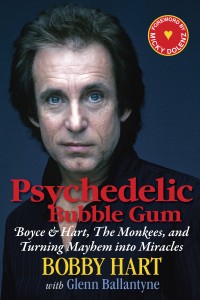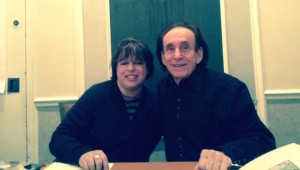Exclusive Bobby Hart Interview at Monkees.net
April 13, 2016 by brad
Filed under M.A. Cassata, news feed
Exclusive Bobby Hart Interview
By M.A. Cassata
It took a few false starts but we promised you an exclusive interview with original Monkees much loved and revered songwriter, Bobby Hart. As many of you loyal fans already know, Bobby Hart will be singing and playing keyboards on The Monkees much anticipated forthcoming studio album, Good Times.
For those of you who don’t know, Bobby Hart was one-half of the prolific ’60s songwriting duo Boyce & Hart and is best known for their involvement with early Monkeess’ recordings. Boyce & Hart were responsible for many of The Monkee’s biggest hits, including “Last Train to Clarksville,” “Words,” “Valleri,” “(I’m Not Your) Steppin’ Stone,” and, Train to Clarks of course, the iconic theme song for the group’s TV show.
Early in their partnership, the duo penned “Come a Little Bit Closer” for Jay and the Americans and in 1967 and later had their own Top 10 hit, “I Wonder What She’s Doing Tonight.” Did you know they also wrote the theme song for “Days of Our Lives?”
On his own, Hart wrote his biggest song ever, “Hurt So Bad” — a hit for three different acts in different decades. Glenn Ballantyne, a longtime friend/songwriter (Brady Bunch, Jackie DeShannon) and co-author of Hart’s memoir, Psychedelic Bubblegum recalls meeting the 60s hit makers for the first time.
“I met Tommy and Bobby in 1968 when they were on top of the charts and I was an 18 year old wannabe songwriter,” he recalls. “I was taking a breaking from walking Sunset Blvd stopping into buildings with music publishers hoping they would listen to my songs when Tommy and Bobby walked in and sat down for lunch. I instantly recognized them and carefully planned it out to meet them at the cash register when they went to pay their bill. I mentioned how I liked songs on their latest album and they knew what I was all about. Song writing. They listened to my story and realized that I was signing my songs to a crooked music publisher and they then arranged for me to play my songs for a major publisher. Pure kindness.”
Informally, Hart became a mentor to Ballantyne for both songwriting and yoga meditation.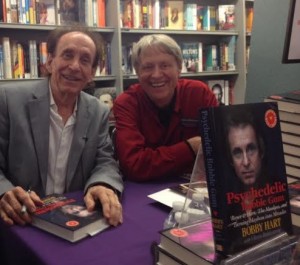
“Our friendship has taken us down many unexpected pathways and only grown deeper over the decades, he explained. “When he decided to focus on telling his life story, he invited me to contribute because I got to share much of the years and because we share the same spiritual platform.”
Just recently, the two creative artists finished several events together: a presentation about setting goals at a Boys & Girls Club, a creative writing workshop at a middle school, and a fundraiser for a college.
Presently, Ballantyne and Hart have begun work on their next book that has a working title of Five Ancient Secrets for Triggering Awesome Creativity. Hart is also in the process of helping to finalize the licensing of the documentary about him and Tommy Boyce, The Guys Who Wrote ‘Em. (In 2014, fans got to see a special unfinished version at a New Jersey Monkees Convention).
As if the Monkees fans favorite songwriters doesn’t do enough, Hart, with Ballantyne’s help is working on the curriculum for a songwriting seminar that will available at colleges and for the rest of us, on bobbyhart.com
In the following interview we catch up with Bobby where he discusses his life, music, working with The Monkees, Psychedelic Bubble Gum and other songwriting projects.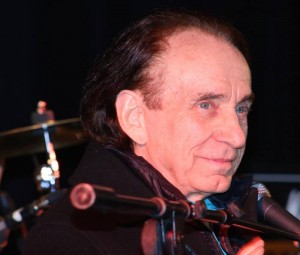
What do you hope fans will take away from reading Psychedelic Bubble Gum?
My writing partner Glenn Ballantyne and I are deeply gratified by the reception our book has received. So many kind readers have told us how they couldn’t put it down, and nine months later it still finds its way onto Amazon’s Top 100. For the Monkee fans who have heard many versions from many sources, I wanted to set the record straight as someone who was there almost from the inception. Tommy Boyce and I worked on music for the Monkees project for nearly a year before the actors were chosen.
I’m sure readers will appreciate how you pointed out that you want to give back to others what you have learned.
My main impetus was to share the deeper aspects of my life’s journey and pass along some of the lessons that I had to learn the hard way: how to stay focused, positive and persistent, visualizing my goals and adjusting them as I discovered deeper meaning to help me move toward a more spirit-based and lasting happiness.
I find your spiritual journey fascinating. Would love to talk to you more about that someday. I like that you said you learned how to become better instead of bitter. I think we all need to learn how to do that and do it well.
As you know, the book is vivid storytelling. In fact, I personally narrated the Audible version (with Micky Dolenz recording his Introduction). But in the print edition, in addition to the stories, I’ve interspersed a few special pages of practical information, tips that I learned along the way. I call them Stepping Stones Thru the Pot Holes of Life.
For some of the younger fans checking out Monkees.net, can you tell them a little bit of your background as a songwriter?
I came to Hollywood when I was eighteen and had a record deal within months. But, it took me six years of struggle, setbacks and honing my craft before hit records came my way.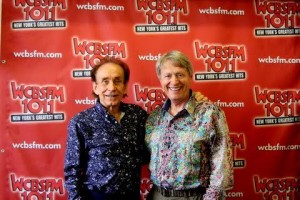
That works! What was your first big break as a songwriter? You mentioned the difference between personal and commercial success.
Almost everyone I meet has written at least one song or poem. But for those who ask me about making a career for themselves as songwriters, I point out that the sentiments and emotions they write down for themselves or loved ones do not always translate into what a mass audience might identify with. Tommy and I learned to write and produce by listening to the radio and then analyzing the elements of each song and record that made a lot of people want to go out and buy it.
How did you hook up with Tommy?
I had met Tommy when I first came to L. A. through my record producer. But, it wasn’t until we had both moved to New York’s Brill Building district that we wrote our first top-ten songs together. In 1964, we had Jay & the Americans #3 Come a Little Bit Closer, Chubby Checker’s Lazy Elsie Molly and I wrote Little Anthony & the Imperials’ top ten Hurt So Bad with Teddy Randazzo and Bobby Weinstein.
What about the 60s Cultural Revolution,—being at the historic Monterey Pop Festival in ’67 with Micky. Would you just recap a little of that experience for our younger readers?
A good deal of Psychedelic Bubble Gum is about Tommy and me returning to Hollywood at precisely the right moment to discover the new psychedelic music that was beginning to flow from the Sunset Strip and incorporate elements of it intro our writing and producing. We were at ground zero to immerse ourselves in the Summer of Love, culminating in the Monterey Pop Festival of 1967. The experience of Joplin, Hendrix and Shankar had a profound influence on our writing and on our individual lives.
Can’t talk about The Monkees without mentioning you! Micky knows that. Fans love every song—Monkees and non-Monkees songs you’ve written. What are some of the stories behind the more popular songs?
In my autobiography, I tell how “Clarksville” started as a miss-heard line in a Beatles song; how the “Monkees Theme” was the result of an assignment to allay any possible adult resistance to seeing four long-haired musicians dressed like hippies on television; and how Tommy had fibbed that we had written a “girl’s name” song and how we had to write “Valerie” in ten minutes on the way to play it for Donnie Kirshner.
Great stories! Of all The Monkees songs you’ve written, which ones make you the most proud?
I’m proud of all the work Tommy and I did with the Monkees and ever grateful for the opportunity. But, four that come to mind are Theme from the Monkees, Last Train to Clarksville, I’m Not Your Stepping Stone and I Wanna Be Free.
Can you explain a little about how it was considered a “big thing” to get a song recorded back then?
Then, as now, there are thousands of songs for every opportunity to have one successful recording artist sing them. And recording isn’t the end. All the stars have to align to have the production come out magical and the promotion equal to the task of exposing the music to a wide audience.
Besides the Monkees, what are some of your favorite musicians that recorded your songs and why?
I loved hearing Alicia Keys’ sing Hurt So Bad and of course Little Anthony’s original recording and Linda Ronstadt’s versions were killer. Watching Andy Williams record I Wanna Be Free was a treat. And the covers by some of my country heroes like Lester Flat & Earl Scruggs’ Clarksville bowled me over.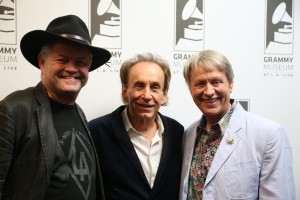
What was it like working with The Monkees in the studio? I’m sure most of our readers already know, but would love to hear more about it anyway!
As you know, Tommy and I worked primarily with Micky and Davy and a little with Peter from time to time. All were consummate professionals in the studio, learning quickly and performing spectacularly. We thought that all four guys were accomplished singers, but Micky’s enthusiastically soulful sound has earned him a place as one of the iconic voices in pop history. Davy Jones’ British Invasion sound fit perfectly with the times and the feelings he expressed in his ballads can still be felt by young and old alike, fifty years later. Peter is an impressive musician and we still work well together.
How did Dolenz, Jones, Boyce & Hart come about?
My friend Christian DeWalden called me one day in 1975, having just returned from Thailand. He said that a promoter would like to bring the Monkees there for some concerts and asked if I would give Micky a call for him. Micky’s response was that he and Davy had been doing some shows together, but Michael was not interested in performing with the Monkees and they didn’t know how to contact Peter. When I reported back to Christian, he thought for a moment then suggested, “Why don’t you and Tommy team up with Micky and Davy?”
The four of us met up at a restaurant that Micky owned on Sunset Boulevard to discuss the prospect, and we had so much fun over lunch that day that we decided that we’d all be open to the idea if the offers made sense. Christian immediately proceeded to expand the southeast Asian tour to include, Singapore, Hong Kong, Taipei, Malaysia and several cities in Japan.
While waiting for the 1996 world tour, another promoter began booking us throughout the U. S. so we put together a program of Monkee hits, Boyce & Hart hits and a lot of clowning around. Micky suggested we call it The Great Golden Hits of the Monkees Show and Tommy chimed in: starring The Guys Who Sang ‘Em and The Guys Who Wrote ‘Em. Capitol Records signed us as Dolenz, Jones, Boyce & Hart (try to say that fast three times) and we recorded two albums for them, one in the studio, and the other live in Japan.
What music artists do you enjoy listening to today?
I enjoy Pharrell Williams, Taylor Swift, Ed Sheeran, Little Big Town and Sam Smith, among others.
What is the latest update on The Guys That Wrote ‘Em? So awe-inspiring! I know Monkees fans can’t wait for the official release.
Thank you for asking. It seems everyone who has seen it agrees that Rachel Lichtman has made a very entertaining and informative documentary. She and her co-producer Andrew Sandoval are reviewing options to find the funds necessary to license the music and TV clips. I’m confident it will find the right home when the needed funds are raised.
Anything else you would like Monkees fans to know?
I came to Hollywood with childlike dreams and no expectation of coming of age in the Age of Aquarius. Yet even during the turbulent sixties, Tommy and I found the primal power of focused creativity and the sheer sense of fun that comes from never taking this world too seriously.
Also that my music is appreciated and seen as valuable so many years after it was introduced, I am grateful. Thank you so much for helping to keep my music alive after all these years and please pass along my gratitude to the fans everywhere.
Purchase Bobby Hart – Psychedelic Bubblegum
Purchase Bobby Hart – First Bobby Hart Solo Album
Purchase Best of Tommy Boyce and Bobby Hart
M.A. Cassata
Entertainment Author
macassata.com Associate Book Editor (Freelance) bearmanormedia.com
Other works: themacwire.com ontheteenbeat.com
 Follow us
Follow us Join us
Join us


